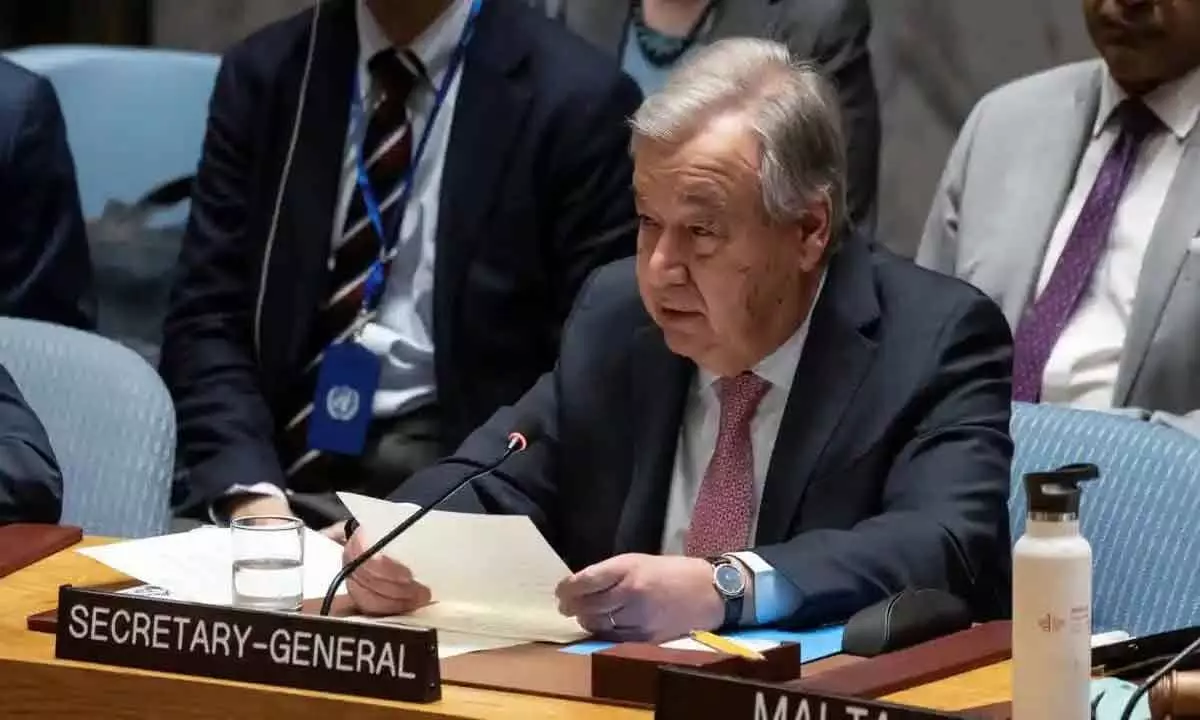Live
- 525 candidates remain in fray for 17 LS seats in Telangana
- Political Prowess on Display: Rajnath Singh and Smriti Irani's nominations galvanise BJP’s poll campaign
- TN government committee identifies 42 elephant corridors in state
- Ola Cabs CEO Hemant Bakshi steps down, firm announces job cuts
- IPL 2024: Kuldeep Yadav's 35 not out propels Delhi to 153/9 against Kolkata
- BJP leader Sambit Patra files nomination for Puri Lok Sabha seat
- Rajiv Pratap Rudy accuses Lalu Prasad of 'killing' developmental schemes in Saran
- Quick action by Telangana Cyber Security Bureau saves citizen's Rs 1 crore
- Types of food diabetics should avoid
- Celebrating National Honesty Day: 20 Quotes to Inspire Integrity
Just In
Middle East on the brink; time for restraint


Iran’s first-ever direct attack on Israel on Saturday night has plunged the world in utter shock and disbelief and leaders are scrambling to prevent...
Iran’s first-ever direct attack on Israel on Saturday night has plunged the world in utter shock and disbelief and leaders are scrambling to prevent the Iran-Israel enmity from spilling into a full-blown war with huge ramifications for global trade – and peace. Already saddled with wars, civil wars and strife, and intense stress due to droughts and floods, the world can ill-afford another war.
Just as air raid alerts went off in Israel to stave off around 300 missiles - cruise and ballistic - and drones fired by Iran a 1,000 km away, alarm bells went off in diplomatic circles and efforts have since been frantic to calm nerves and de-escalate tensions. Four countries, namely, the US, the UK, France, Jordan timely chipped in to help Israel foil about 99 per cent of the missiles fired by Iran and its allies from Iraq and Yemen. Thankfully, no serious damage or loss of life occurred.
An infuriated Israel is deliberating on how to respond, whether directly or covertly. It is hoped that Benjamin Netanyahu, already under pressure due to waning popularity after October 7 attack by the Hamas, does not root for direct retaliation against Iran. He has, nevertheless, warned Israel will cause adequate pain to Iran. The world community, which was helpless even as Iran warned of attacking Israel, cannot ask Tel Aviv not to do anything to protect its sovereignty and people. But what it should do is help avert a direct war, for it can flare up into a regional war, pulling in the US and other allies to help Israel, against a strong warning by Russia.
For Iran’s part, it said it was only a retaliation against attack on its Syrian consulate, which killed two top military commanders. But launching a direct attack is different. But then it also gave a prior warning of its attack. It is strange that an element of suspense is missing in the entire plot. Further, Iran says it no retaliation by Israel, saying it deems its actions concluded. May be it wanted to be seen by its people as avenging the Damascus attack, and at the same time, it wanted to avoid escalation, too. But, so many things could have gone wrong. The entire episode sends a message that letting proxy wars spiral into the open is best avoided. In a way, both Israel and Iran crossed all red lines in each other.
It is interesting to note Iran supported Israel when it declared independence in 1948 but turned against it. Israel’s attack clearly proved a game-changer in catapulting tensions. Its pride salvaged after avenging the attack on Damascus consulate, Iran has drawn a line to stop further escalation. Israel, too, has not lost face as it blunted the Iranian attack and has unflinching allies by its side. While Israel would want to respond “at the time of our choosing” it must heed wise counsel to avoid a direct war with Iran. And the latter, too, should see the reason. Avoiding war is a win-win strategic achievement for both.
At the UNSC, Russia posed right questions, calling out hypocrisy of the West. It asked pointedly why the UNSC did not condemn the April 1 Israel attack on the Syrian embassy in Damascus - a violation of the Vienna Convention. It also drew the attention to Israel’s raids on Syria, provocative use of force by the West in Middle East. Thus, it is time the UNSC proved its worth and involve all the key members to prevent any more wars or conflicts. It should also arrive at solutions to the threats to maritime traffic.

© 2024 Hyderabad Media House Limited/The Hans India. All rights reserved. Powered by hocalwire.com






